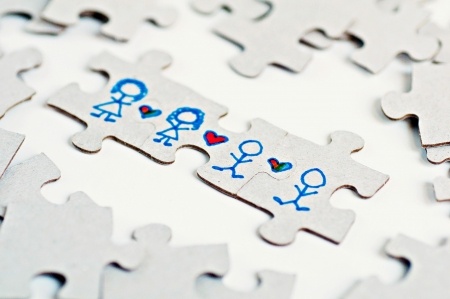Bisexuality And Jealousy: Bi Men’s Jealous Feelings Depend Upon Their Partner’s Sex
November 4, 2015 by Justin Lehmiller
Evolutionary psychologists argue that men and women have evolved different jealousy patterns. They claim that men are more worried about their partners becoming sexually unfaithful, while women are more concerned about their partners becoming emotionally unfaithful. The rationale behind this is that men don’t want to get stuck raising kids that aren’t their own, while women want to ensure that the father of their children sticks around and provides for them. Many studies have provided support for this theory, indicating that men are more jealous about the prospect of their partner having sex with someone else, while women are more jealous about the thought of their partner establishing other intimate relationships [1].
But what about non-heterosexuals? What happens when reproductive concerns don’t factor into the equation? Research has revealed that both gay men and lesbians are typically more concerned with emotional infidelity than sexual infidelity–in other words, the pattern doesn’t really change for lesbians, but it does for gay men [1]. Given these findings, could it be that bisexual men show different jealousy patterns based upon the sex of the person they’re dating?
A recent study published in the Journal of Social and Personal Relationships tested this idea. Researchers recruited 134 men and women through LGBT organizations who identified as bisexual and were currently involved in a monogamous relationship [2]. Participants ranged in age from 19-68 and everyone completed a survey that included the following question:
Please think of a serious committed romantic relationship that you have had in the past, that you currently have, or that you would like to have. Imagine that you discover that the person with whom you’ve been seriously involved became interested in someone else and this distresses you. What would distress or upset you more (choose only one):
1. Imagining your partner enjoying passionate sexual intercourse with that other person
2. Imagining your partner forming a deep emotional attachment to that person
After selecting which option was more distressing, participants identified the sex of the person they were thinking about to ensure it was the same as their current partner’s sex.
So what did they find? Men dating women were more concerned about sexual infidelity (i.e., option #1) relative to women dating men (49% vs. 17%, respectively), which is consistent with the results typically obtained in research on heterosexuals. In contrast, men dating men and women dating women both showed relatively low levels of concern about sexual infidelity and did not significantly differ from one another (26% vs. 25%, respectively).
Overall, these findings tell us that the only bisexuals for whom sexual infidelity is seen as more distressing than emotional infidelity are men who currently have female partners. This is consistent with a reproduction threat-based perspective, which suggests that men’s jealousy stems from concerns about their female partners getting pregnant by other guys. In addition, these findings tell us that bisexual women’s concerns with infidelity do not seem to depend upon their partner’s sex.
There are some important limitations to this research worth noting, with one being that participants were forced to pick only one of the two options (sexual vs. emotional infidelity). It could be that some people are equally distressed by these options. Alternatively, others may perceive that emotional infidelity necessarily implies sexual infidelity (i.e., perhaps emotional infidelity is more distressing because it is perceived as a double threat in this case).
In addition, participants were not asked about the sex of the person they imagined their partner cheating with, which may have muddled the results a bit. Would bisexual men be as concerned with sexual infidelity if they imagined their female partners having sex with other women? If the reproduction-threat theory is correct, then no.
In sum, these results provide further support for the idea that the nature of jealousy is not the same across genders and sexualities. There is a lot of variation in what sparks feelings of jealousy; however, overall group differences would appear to be consistent with an evolutionary perspective.
Want to learn more about Sex and Psychology ? Click here for previous articles or follow the blog on Facebook (facebook.com/psychologyofsex), Twitter (@JustinLehmiller), or Reddit (reddit.com/r/psychologyofsex) to receive updates.
[1] Carpenter, C. J. (2012). Meta-analysis of sex differences in responses to sexual versus emotional infidelity: Men and women are more similar than different. Psychology of Women Quarterly, 36, 24-37. doi:10.1177/0361684311414537
[2] Scherer, C. R., Akers, E. G., & Kolbe, K. L. (2013). Bisexuals and the sex differences in jealousy hypothesis. Journal of Social and Personal Relationships, 30, 1064-1071. doi:10.1177/0265407513481446
Image Source: 123rf.com/krisonealphotography
You Might Also Like:

Dr. Justin Lehmiller
Founder & Owner of Sex and PsychologyDr. Justin Lehmiller is a social psychologist and Research Fellow at The Kinsey Institute. He runs the Sex and Psychology blog and podcast and is author of the popular book Tell Me What You Want. Dr. Lehmiller is an award-winning educator, and a prolific researcher who has published more than 50 academic works.
Read full bio >


